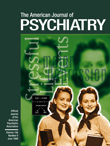Freud’s Practice of Psychoanalysis
To the Editor: There are four valuable aspects to the recent documentation by David J. Lynn, M.D., and George E. Vaillant, M.D., of Freud’s frequent departures from anonymity, neutrality, and confidentiality in his clinical practice. First, it sheds an informed light on a less recognized facet of our profession’s history. Second, the authors’ demonstration that Freud worked in an emotionally expressive and behaviorally resilient manner is a useful corrective to the caricature of psychoanalytic technique made by the lay public and, unfortunately, even by some psychiatrists and psychoanalysts. Third, the article by Drs. Lynn and Vaillant is useful in reminding us that noninterpretive elements (e.g., warmth, support, acceptance) contribute heavily to the beneficial results of even those psychotherapies that rely on interpretive techniques. Finally, the authors’ contribution is respectable because they avoid the temptation to speculate regarding Freud’s reasons or motives (which could have included his pioneering and triumphant status in the field, his character, the particular era in the history of psychotherapy, etc.) regarding his departures from the techniques he officially deemed desirable.
While I regard the authors’ contribution as valuable, I also discern two risks inherent in its publication. First, the material in this article can be used for Freud bashing. Finding that Freud said one thing and did another, the ever-eager critics of Freud might seek to debunk other profoundly important and valid aspects of his contributions. Second, some less responsible members of our profession might exploit Freud’s licenses with technique in order to justify their own propensities toward boundary violations. This well-intentioned article might thus unwittingly contribute to professional “superego lacunae” (1) in vulnerable individuals.
1. Johnson AM, Szurek SA: The genesis of antisocial acting out in children and in adults. Psychoanal Q 1952; 21:323–343Crossref, Medline, Google Scholar



